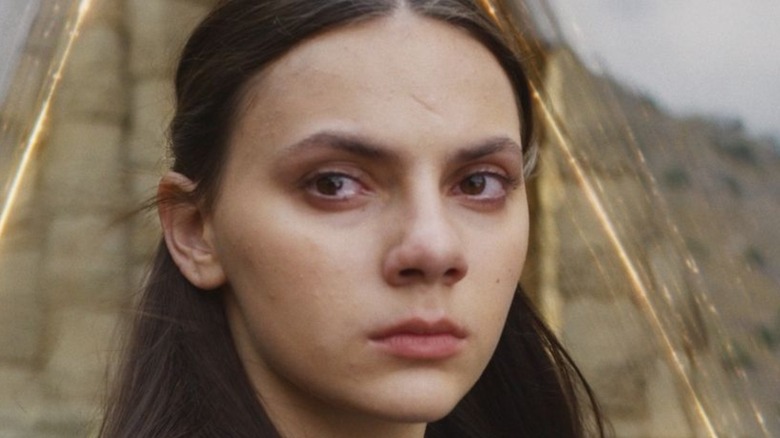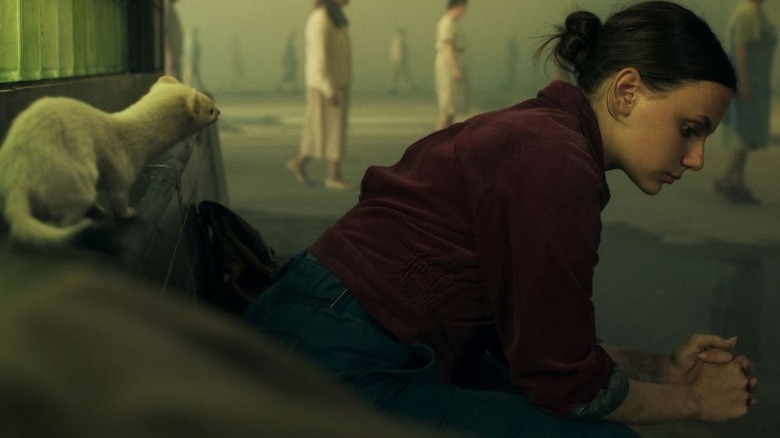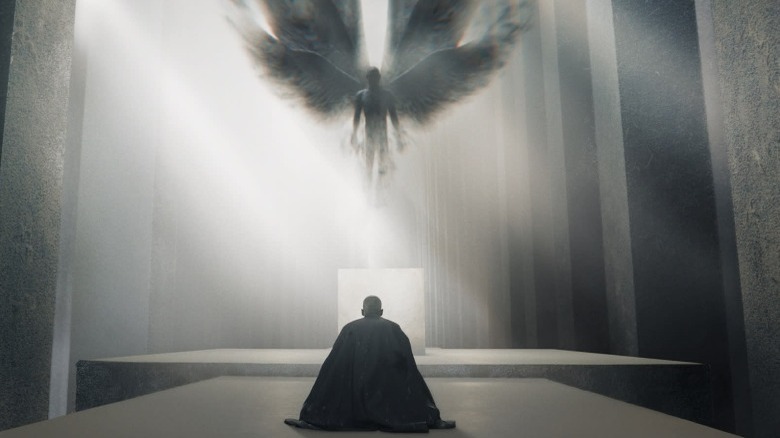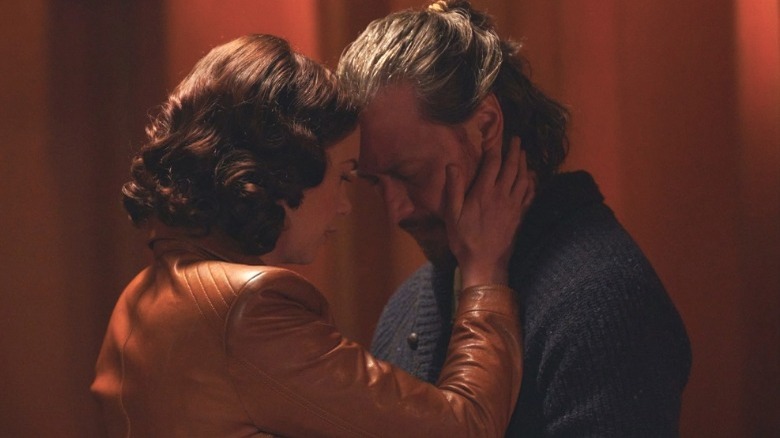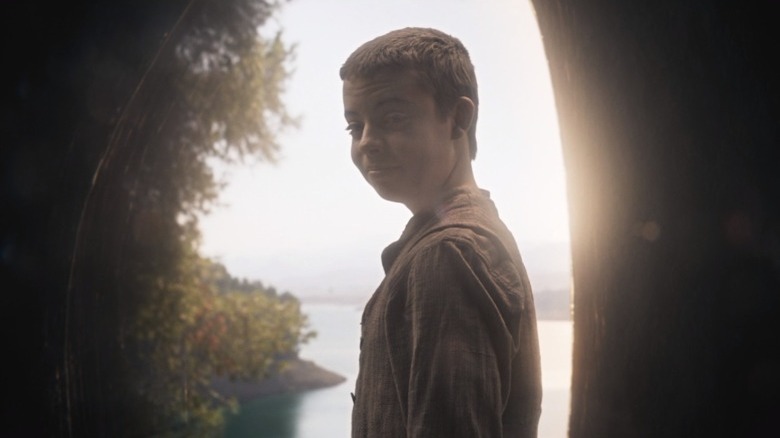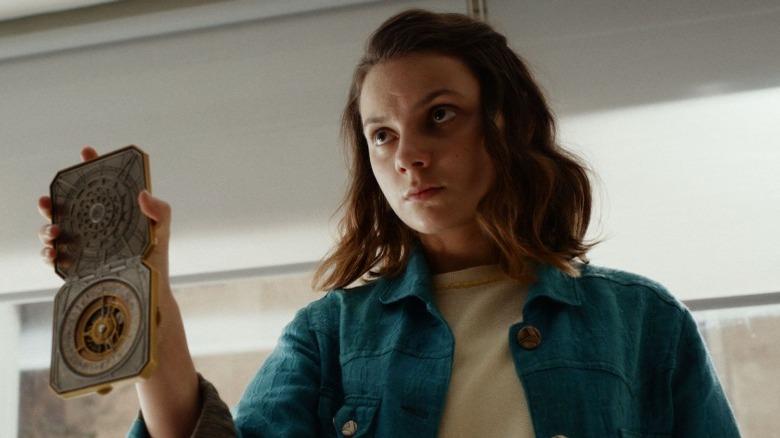The Ending Of His Dark Materials Season 3 Explained
It's been an adventure to get to the end of HBO's adaptation of Phillip Pullman's "His Dark Materials" trilogy. Two long years after the finale of Season 2, and well more than a decade since the failure of "The Golden Compass" in 2009 dashed our hopes for a cinematic trilogy, the full tale of Lyra (Dafne Keen), Will (Amir Wilson), and a multiverse of others has finally been told. After hopping between Lyra's world and just a few others in Seasons 1 and 2, Season 3 expands the story to the Kingdom of Heaven itself, bringing the full philosophical and heartbreaking weight of Pullman's clockwork design to the screen.
When considering the sheer narrative sprawl of "His Dark Materials," it's a small miracle that it covered nearly everything in just 23 episodes. After Season 1 got an impossible amount of exposition out of the way, Season 2 hit the ground running and was a step up in terms of character development and action. Season 3 is almost all pay off, as the small ripples of previous seasons pay off in world-shaking events like war, love, and a fundamental shift in the nature of the universe. For non-experts (or those that haven't read the books in a while), let's sort out the angels from the Dust and dark matter (spoiler: they're all the same thing). This is the ending of "His Dark Materials" Season 3, explained.
Asriel's war and the Authority
After a standalone Lord Asriel episode was a casualty of the pandemic in Season 2, James McAvoy gets more screen time than the rest of the series combined in Season 3, and the full scope of Asriel's war becomes clear. The "His Dark Materials" series posits that angels exist, but otherwise takes apart the idea of a Christian metaphysics even more than the most acerbic satire like "Dogma" (which you unfortunately can't stream anywhere). The Authority, which is what they call "God" in Asriel's world, is nothing more than an angel that decided he was in charge long ago, and has essentially just been deceiving the multiverse into believing he's the creator.
Just as Asriel's study of Dust leads him into conflict with the repressive Magisterium in his own world, his journey into other worlds (which unfortunately comes at the expense of Roger's life) leads him to assemble a massive army into an all-out assault on the forces of the Authority, the Kingdom of Heaven. After more or less ignoring his daughter Lyra her entire life, he learns that his anti-holy war is ultimately all just a distraction to keep the Authority's forces busy while Lyra and Will restore the balance of the universe in an unexpected way.
Eve and the Serpent
Like the "Song of Ice and Fire" in "Game of Thrones" or the portentous predictions in every "Harry Potter" movie, "His Dark Materials" has several different prophecies in play. The only real consensus is that Lyra is the key to it all. The Witches and the Magisterium's alethiometer have dubbed her a "new Eve," indicating she's due for some sort of metaphorical "fall" that will bring sin to the world. But "His Dark Materials" proposes that the story of Eve, the Serpent that tempts her, and the supposed Fall of Man is just another story that's been interpreted incorrectly by those in power for millennia.
Mary Malone (Simone Kirby) is told that she "must play the Serpent" by the voice of Dust through her computer, and she eventually finds her way to the world of the elephant-like Mulefa creatures to wait for Lyra and Will to arrive. Once they do, she unwittingly plays the Serpent just by describing the moment she fell in love with another woman and realized she couldn't be a nun anymore. In a stirring scene, she gives word to the "procreant urge of life" that Lyra and Will are only just beginning to figure out for themselves. This gives them the exact push they need to realize that they're in love, and to be deepened by it in a way that shifts the entire balance of consciousness in the many worlds.
A heartbreaking farewell
If you're reading this just after finishing the "His Dark Materials" finale, there's a good chance your eyes are still drying. In one of the most powerfully sad endings in literature and now television, Lyra and Will reach the end of their impossible, world-shattering journey only to discover they can't live in the same universe together and can never see one another again. With just a few devastating lines of explanation from the angel Xaphania (Chipo Chung) and the witch Serafina Pekkala (Ruta Gedmintas), we learn that the holes between worlds made by the knife are also what released evils like the soul-eating Spectres, and must almost all be closed. Will and Lyra also have to return to their respective worlds, lest their daemons perish after spending too long in the wrong place.
With a sinking, helpless feeling, Lyra and Will cycle through the stages of grief quickly. Dafne Keen and Amir Wilson do some superb acting as the story finally slows down, delivered to a place of pure emotion and wrenching loss. Their love represents, quite literally, the pull toward connection, learning, and hope that unites all conscious beings. Like the alethiometer itself, Pullman's elegant story uses symbols and abstractions to deliver to us a stunning and important truth: love is really just as world-changing and important as we feel it to be, but to love is to sign up for grief and partings, like leaving part of your soul on the shore.
Lyra's great betrayal
Something that gets a little lost by the wayside from Season 1 of "His Dark Materials" is a part of the Witches' prophecy that Lyra will commit "an act of great betrayal" in fulfilling her magical destiny. She assumes that this betrayal is bringing Roger (Lewin Lloyd) to Asriel, which results in Roger's horrific murder. She spends the rest of her journey trying to atone for this mistake. But a mistake is all it is, and even Roger tells her it's not her fault when she finally meets him again in the Land of the Dead. The real betrayal, which she knowingly commits in order to get back to Roger, is leaving her own daemon Pantalaimon (Kit Connor) behind to get there.
She unwittingly leads Roger to his death, but she knowingly and consciously abandons her own soul, since daemons (as well as angels and other beings made solely of Dust) can't go to the Land of the Dead. In a scene just as heartbreaking as her later goodbye with Will, Pantalaimon pleads with Lyra not to leave him behind.
The Metatron
"His Dark Materials" has a relatively chaotic approach to destiny and climactic events for a fantasy series. Prophecies are misleadingly worded, side quests and distractions turn out to have been the point all along, and even the villain turns out not to be the villain. We learn in Season 3 that the supposedly all-powerful Authority has been usurped by his own Regent, the Metatron. Imagine if in "Lord of the Rings" they got to Mordor and Sauron had been replaced with some guy named Enoch.
That's exactly who the Metatron (Alex Hassell) is: a once-mortal man who became an angel, was appointed as the Authority's right-hand man eons ago, and eventually seized power for himself. Just like the Authority, he wants to suppress knowledge and free will in order to hold onto power for himself. He tells Asriel that he wants to essentially begin the Spanish Inquisition again in all the worlds he has dominion over. The Metatron still has vestiges of human emotions like pride and arrogance. For example, after Asriel sends him a message by (temporarily) vaporizing his archangel Albarus (Wade Briggs), the Metatron responds with an all-out assault on Asriel's forces that proves to be his own undoing.
The fall into the Abyss
Although they're both outright villains willing to murder children, Lyra's parents still have an engaging story of reconnection that's one of Season 3's most compelling subplots — a dark, Gothic romance between monsters for the ages. As the head of the Oblation Board and Roger's murderer, respectively, Marisa Coulter and Asriel Belacqua have lost the opportunity to be in Lyra's life in any meaningful way. In their final act, tumbling into the Abyss and taking the Metatron with them into oblivion, they buy Lyra crucial time to escape the Kingdom of Heaven's forces and fulfill her destiny.
They're as integral to the fate of the universe as Lyra, and not just because they brought her into existence by way of a torrid, scandalous affair. The only way they were able to defeat the cunning and manipulative Metatron is by taking advantage of their own fractured souls, using the humanity that they've lost to defeat a superhuman foe. Asriel's arrogance and self-importance — he all but fancies himself a god — is what draws the Kingdom of Heaven out for the final battle. He then holds part of the Metatron's attention in a battle of wills when he enters the clouded mountain. This is what enables Marisa to deceive the Metatron into believing she would join forces: she utilizes the same ability to "hide what makes her human" from the Spectres, and her ability to separate from her daemon to electrify the Abyss with Asriel's device.
Father Gomez and Balthamos
Like many of the best "Games of Thrones" episodes, the penultimate episode of the third season of "His Dark Materials," "The Clouded Mountain," has the most satisfying and thrilling action: the gigantic battle between Asriel's forces and the Authority/Metatron. So it's left to the series finale "The Botanic Garden" to focus more on emotional drama than suspense. There's one exception in the form of the uber-zealot Father Gomez (Jamie Ward), who doesn't have an inter-dimensional smartphone and thus is clueless that the "god" that his Magisterium worships has literally crumbled into dust. Convinced of his own righteousness, he follows Lyra into the world of the Mulefa to kill her before she can become the new Eve.
To our relief, it's a complete bait and switch: mid-way through the finale, Father Gomez is unceremoniously dispatched by the angel Balthamos (Kobna Holdbrook-Smith). Helpfully, Balthamos explains the thematic underpinnings of the story to Gomez with some choice parting words: "Desire is not sin. Love takes a million forms, each of them beautiful. Each of them worthy." There is magic in the universe, and angels with the properties of the divine, but in the world of "His Dark Materials," none of that entails the shutting down of inquiry or the imposition of celibacy like the Magisterium. Even angels themselves fall in love: After killing Father Gomez, Balthamos fades into Dust particles himself to join his dear departed Baruch (Simon Harrison).
In its depiction of the folly of zealotry, its re-interpretation of the "fall" of Eve, and its relatively subtle inclusion of same-sex relationships between angels and humans (like Mary Malone), "His Dark Materials" rejects the pitfalls of religion but endorses the spiritual affirmation of faith.
Will and Kirjava
The idea of daemons (not to be confused with Matt Smith's "House of the Dragon" character) is one of the biggest appeals of "His Dark Materials." It's impossible not be jealous of Lyra and Pantalaimon's close relationship, and the longer you watch the show or read Pullman's books, the more the idea feels intuitive. Who wouldn't want to have an animal companion who's an extension and reflection of your own soul? In "His Dark Materials," each human is paired with a tangible conscious animal in a body made of pure thought, or Dust itself.
As a sort of vicarious wish fulfillment, perhaps, Season 3 reveals that Will, an interloper supposedly from our own daemon-less dimension, does in fact have a daemon that is pulled into external form by his journey through the Land of the Dead. Just the way his father eventually met his daemon by spending long enough in Lyra's world, Will meets Kirjava (Patricia Allison of "Sex Education" fame) at the same time that Lyra and Pantalaimon are reunited. Kirjava eventually returns with Will to our world, although it isn't clear if she'll eventually fade back into intangibility at some point.
The Land of the Dead and the final window
"His Dark Materials" is a paradox: it tells a story about the shape of all possible worlds and reimagines the way we conceive of dark matter, consciousness, and big ideas like Heaven and Hell. But at its heart, it's a simpler story about Lyra and the way that her relationships shape the destiny of the universe. Her connection with Will changes the flow of Dust and brings about the end of Destiny, but it's really her childhood bond with Roger that powers the entire story, and ultimately saves everyone's soul from a dreary purgatory. Pound for pound, it's one of the best TV friendships in history.
To make up for leading Roger to his death, Lyra betrays her own soul and leaves Pantalaimon behind to travel to the Land of the Dead. What they find is a dim, gray world where dead souls stumble around trying not to be harassed by hideous screeching harpies. All humanity can do is bemoan the lack of whatever idyllic afterlife they were falsely promised as their memories slowly fade. Lyra and Will, by opening a window to another world, allow the souls of the dead to disintegrate back into Dust, mingling with the consciousness of the living universe once again and escaping an eternal Limbo.
Why can't Lyra read the alethiometer anymore?
Although it's a small sacrifice compared to saying goodbye to Will, Lyra is also dismayed to find out that she's no longer able to read the alethiometer as "His Dark Materials" draws to a close. The ever-wise Serafina Pekkala explains to Lyra that while she used to read it "by grace," she can eventually only regain the ability by studying the same dense volumes of symbols that the Magisterium experts used to read the device. It's no coincidence that this ability has been lost at the same moment that her daemon settled into shape and she acted on her connection with Will.
"His Dark Materials" concedes that growing up means losing your innocence, just as the Magisterium and zealots like Mrs. Coulter believe, but also that this is nothing to fear. In fact, Lyra and Will's loss of innocence saves existence from a Dust-free, gray existence. But it's only by losing our innocence that we can begin the long, arduous process of attaining wisdom. After a life of study, creativity, and conscious attention, we can recapture some of the grace that children are born with.
The bench, the garden, and the future
"His Dark Materials" ends with the touching (but devastating image) of Lyra and Will fulfilling their promise to return to the same bench, in a botanical garden that exists in both of their worlds, on Midsummer's Day (June 24th in England) every year for an hour to be "with" one another, worlds apart. Already wise beyond her years after what she's been through, Lyra outlines that the hour on the bench can be one exception even if they meet new people: "We must be kind to them. We won't compare them. But we'll come here, just for an hour."
Somehow "His Dark Materials" finds hope within all-encompassing heartbreak and we see in a montage that Lyra and Will are growing up, returning to the bench each year and hopefully living full lives otherwise. HBO tantalizingly ends the series by hinting that Lyra and Pan will have more adventures, perhaps referencing a wish to eventually adapt Phillip Pullman's two-thirds-finished "The Book of Dust" trilogy. Will we can only imagine in our world, living to the fullest and awkwardly hiding his large cat daemon wherever he goes.
